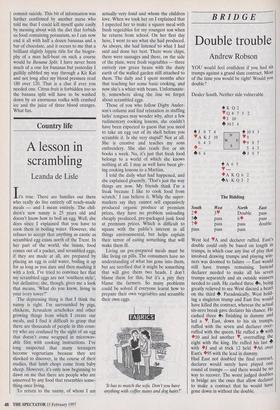BRIDGE _
Double trouble
Andrew Robson
YOU would feel confident if you had six trumps against a grand slam contract. Most of the time you would be right! Would you double?
Dealer South. Neither side vulnerable 4 J. 8 7 411, A K J
6 4 3 • — + 8 6
4
4 10 IFQ
K Q 2
8 7 10 + 10 5 4 5 2
4 10
• 9
• 9 5 +J
9 3 8 7 4 3 9 7
N W E
S
4 A 6 5
— • A K Q 6 2 +A K Q 3 2 The Bidding South West North East 2♦ 3, pass Double 6♦ pass pass 7• pass pass double pass pass pass West led VA and declarer ruffed. East's double could only be based on length in trumps, in which case any line of play that involved drawing trumps and playing win- ners was doomed to failure — East would still have trumps remaining. Instead declarer needed to make all his seven trumps separately and six outside winners needed to cash. He cashed three 4s, being greatly relieved to see West discard a heart on the third 4. Paradoxically, West hold- ing a singleton trump and East five would have killed the contract, whereas the actual six-zero break gave declarer his chance. He cashed three 4s finishing in dummy and led a V. East, down to his six trumps, ruffed with the seven and declarer over- ruffed with the queen. He ruffed a with *10 and led another V, overruffing the eight with the king. He ruffed his last • with •J and at trick 12 held *A6 over East's *95 with the lead in dummy. Had East not doubled the final contract, declarer would surely have played one round of trumps — and there would be no way to recover. The worst judged doubles in bridge are the ones that allow declarer to make a contract that he would have gone down in without the double.


























































 Previous page
Previous page